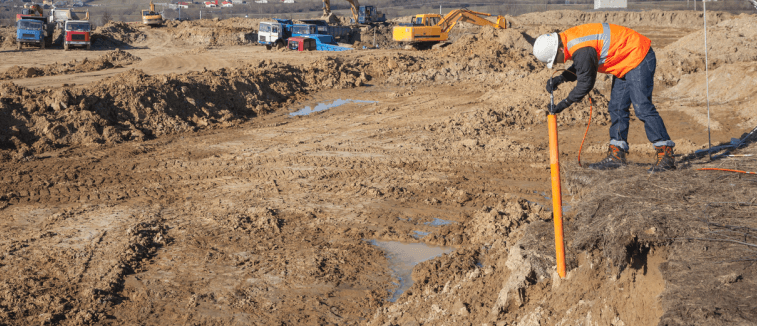Geotheta Things To Know Before You Buy
Wiki Article
Some Known Factual Statements About Geotheta
Table of ContentsThe 9-Minute Rule for GeothetaThe 5-Minute Rule for GeothetaGeotheta Can Be Fun For AnyoneGeotheta - The FactsThe Single Strategy To Use For Geotheta

They carry out site investigations, accumulate samples, execute research laboratory tests, and analyze data to review the viability of the ground for construction projects - Consulting Engineers. Based on their findings, geotechnical engineers give referrals for structure style, slope stability, maintaining frameworks, and mitigation of geotechnical risks. They team up with other specialists, such as designers, architectural engineers, and construction groups, to make certain that geotechnical considerations are integrated right into the general project design and application
By evaluating the habits and properties of dirt and rock, they can recognize prospective geotechnical risks such as landslides, dirt settlement, or slope instability. Their know-how aids avoid failings or mishaps that could endanger lives and residential property. Here are some comprehensive tasks and obligations of a geotechnical designer: Site Examination: Geotechnical engineers conduct website investigations to gather data on subsurface conditions.
They analyze the data to understand the homes and actions of the soil and rock, including their toughness, permeability, compaction characteristics, and groundwater conditions. Geotechnical Evaluation and Design: Geotechnical engineers evaluate the data collected during website examinations to evaluate the stability and viability of the website for building projects. They execute geotechnical estimations and modeling to examine aspects such as bearing capacity, settlement, incline security, side planet stress, and groundwater circulation.
Examine This Report about Geotheta
Structure Layout: Geotechnical designers play an important role in creating structures that can securely sustain the desired framework. They examine the soil problems and load demands to identify the suitable foundation kind, such as superficial foundations (e.g., footings), deep foundations (e.g (https://telegra.ph/Why-Geotheta-is-Your-Go-To-for-Geotechnical-Engineers-in-South-Africa-08-02)., stacks), or specialized techniques like soil enhancement. They think about factors such as negotiation limits, bearing ability, and soil-structure communication to develop optimal foundation stylesThey review building plans, screen website activities, and perform field inspections to confirm that the style suggestions are complied with. If unpredicted geotechnical issues develop, they evaluate the situation and supply referrals for remediation or modifications to the design. Threat Evaluation and Reduction: Geotechnical designers analyze geotechnical threats and dangers connected with the project site, such as landslides, liquefaction, or dirt erosion.

Collaboration and Interaction: Geotechnical designers function very closely with other experts included in a project, such as designers, architectural engineers, and construction teams. Reliable communication and cooperation are important to incorporate geotechnical factors to consider right into the general task style and construction procedure. Geotechnical engineers offer technological expertise, answer questions, and make sure that geotechnical requirements are satisfied.
Not known Facts About Geotheta
Here are some kinds of geotechnical designers: Foundation Engineer: Structure engineers specialize in developing and assessing structures for structures. They evaluate the dirt conditions, lots requirements, and website attributes to determine one of the most appropriate structure kind and design, such as shallow structures, deep foundations, or specialized techniques like pile structures.They review the aspects affecting incline stability, check over here such as dirt homes, groundwater conditions, and slope geometry, and establish strategies to avoid incline failings and alleviate risks. Quake Designer: Quake designers concentrate on evaluating and creating structures to endure seismic forces. They evaluate the seismic threat of a site, examine soil liquefaction possibility, and create seismic layout criteria to make certain the safety and security and strength of structures during quakes.
They execute field screening, accumulate samples, and analyze the collected information to identify the dirt residential properties, geologic developments, and groundwater conditions at a site. Geotechnical Instrumentation Designer: Geotechnical instrumentation designers concentrate on monitoring and gauging the behavior of dirt, rock, and structures. They install and keep instrumentation systems that check variables such as dirt negotiation, groundwater levels, slope movements, and architectural variations to evaluate performance and give early warnings of possible problems.
Fascination About Geotheta
They conduct examinations such as triaxial examinations, loan consolidation tests, straight shear examinations, and leaks in the structure examinations to gather information for geotechnical analysis and design. Geosynthetics Designer: Geosynthetics designers specialize in the layout and application of geosynthetic materials, such as geotextiles, geogrids, and geomembranes. They utilize these materials to enhance soil stability, reinforce slopes, give drainage remedies, and control erosion.They tend to be investigatory people, which indicates they're intellectual, reflective, and analytical. They are interested, methodical, reasonable, analytical, and logical. Some of them are likewise social, implying they're kind, generous, cooperative, person, caring, handy, compassionate, sensible, and friendly - Geo Tech Engineer.
In the office environment, geotechnical engineers use specialized software program tools to perform calculations, develop layouts, and evaluate data. They prepare reports, review project requirements, interact with customers and staff member, and coordinate project activities. The office setup gives a favorable environment for research, analysis, and partnership with various other experts included in the job.
Geotheta Fundamentals Explained
They frequently go to project websites to perform site examinations, evaluate geotechnical conditions, and gather information for analysis. These brows through include traveling to various areas, occasionally in remote or difficult surfaces. Geotechnical designers might perform soil sampling, conduct tests, and display building tasks to guarantee that the geotechnical facets of the job are being implemented correctly.Geotechnical engineers likewise function in specialized geotechnical labs. Geotechnical lab engineers work thoroughly in these settings, taking care of screening devices, running instruments, and tape-recording data.
Report this wiki page